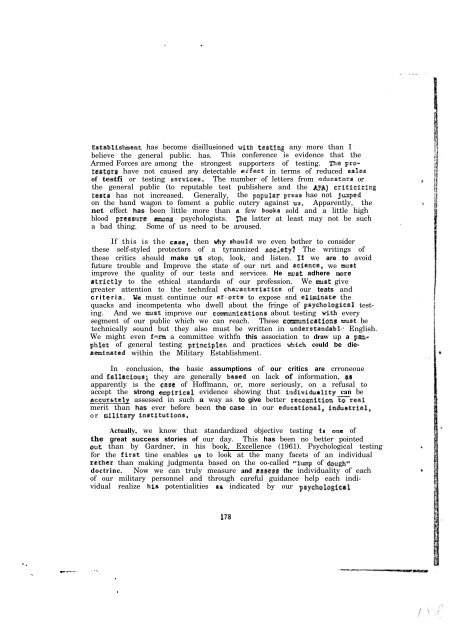Technical Report - International Military Testing Association
Technical Report - International Military Testing Association
Technical Report - International Military Testing Association
You also want an ePaper? Increase the reach of your titles
YUMPU automatically turns print PDFs into web optimized ePapers that Google loves.
--<br />
.,<br />
-__. . . .<br />
,Establlshment has become disillusioned with testing any more than I<br />
believe the general public. has. This conference is evidence that the<br />
Armed Forces are among the strongest supporters of testing. T!l2 protestors<br />
have not caused any detectable eifect in terms of reduced sale8<br />
of testfi or testing ecrvicee, The number of letters from educator6 or<br />
the general public (to reputable test publishers and the APA) critfciztcg<br />
teats has not increased. Generally, the poFuler pre6e hae not j-pad<br />
on the band wagon to foment a public outcry against u3. Apparently, the<br />
net effect has been little more than a few booka sold and a little high<br />
blood preesure BJXXXI~ psychologists. The latter at least may not be such<br />
a bad thing. Some of us need to be aroused.<br />
If this is the case, then why should we even bother to consider<br />
these self-styled protectors of a tyrannized society? The writings of<br />
these critics should make us stop, look, and listen. If we are to avoid<br />
future trouble and Improve the state of our nrt and aclence. we must<br />
improve the quality of our tests and services. He uwst adhere more<br />
etrictly to the ethical standards of our profession. We must give<br />
greater attention to the technfcal cha:acterfstice of our teats and<br />
criteria. We must continue our ef:orts to expose snd elimfnate the<br />
quacks and incompetenta who dwell about the fringe of psychological testing.<br />
And we muat improve our communications about testing 4th every<br />
segment of our public which we can reach. These cmdnicutions met be<br />
technically sound but they also must be written in underatandabl.. English.<br />
We might even form a committee withfn this association to draw up a pmphlet<br />
of general testing principles. and practices &ich could be diesemfnated<br />
within the <strong>Military</strong> Establishment.<br />
In conclusion, the basic assumptions of our critics are crroneoue<br />
and ftIliscfou8; they are generally baaed on lack of information, aa<br />
apparently is the case of Hoffmann, or, more seriously, on a refusal to<br />
accept the strong eolpirical evidence showing that fudfvfdurlity can be<br />
accurately assessed in such a way as to give better recognition toreal<br />
merit than has ever before been the case in our educstional, fnduetrinl,<br />
or rillitory lnetitution5.<br />
Actually, we know that standardized objective testing is ona of<br />
the great success stories of our day. This has been no better pointed<br />
out than by Gardner, in his book, Excellence (1961). Psychological testing<br />
for the firat tine enables us to look at the many facets of an individual<br />
rether than making judgmenta based on the oo-called “lump of dough”<br />
doctrine. Now we can truly measure and assess the individuality of each<br />
of our military personnel and through careful guidance help each individual<br />
realize hts potentialities ae indicated by our peychological<br />
.<br />
.<br />
178<br />
--_









